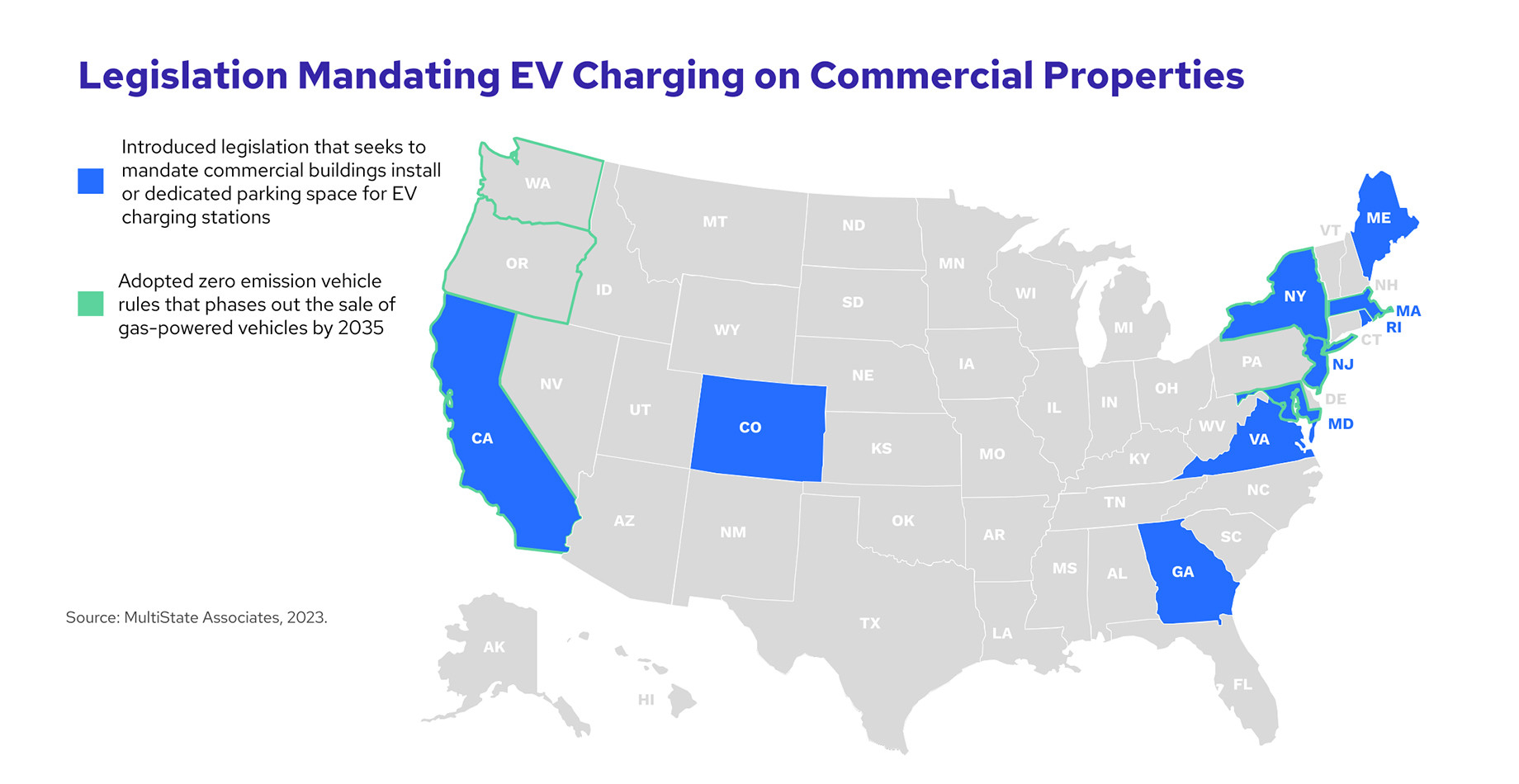Electric vehicles have been a major topic in state legislatures this year, with lawmakers introducing more than 500 bills across 47 states. The uptick in EV legislation comes as the Biden Administration proposes stricter emissions requirements for new vehicles sold in the country and a growing number of states, led by California, look to phase out the sale of gas-powered vehicles in an effort to boost EVs sales. While much of the legislative activity on EVs continues to focus on tax credits and rebates for drivers and businesses, several pieces of legislation enacted this session could emerge as trends for commercial property owners to be aware of moving into 2024.
The commercial market for publicly available charging stations is slowly developing as more retailers such as Walmart and 7-Eleven form partnerships with charging companies to install stations at their locations. This year, lawmakers in Mississippi (MS HB 1060), Oklahoma (OK SB 502) and Texas (TX SB 1002) enacted legislation that would require investor-owned utilities to create separate business entities that do not rely on ratepayer funds to build EV charging stations. Essentially, these bills would allow non-electric utilities to enter the market and sell electricity to EV drivers who use charging stations at their locations at a sustainable rate.
The EV bills enacted this year that directly impact commercial property owners are those that require owners to either install charging stations at properties or allow charging stations to be built. For example, a pair of Minnesota bills (MN SF 3035 & MN HF 3028) signed by Governor Tim Walz (D) require a minimum number of EV-capable, EV-ready and EV-installed spaces to be included in new commercial buildings that provide onsite parking. Many Western cities and some states have used EV-capable, EV-ready and EV-installed requirements in their building codes as a way to distinguish among varying levels of EV readiness. Along similar lines, Rhode Island lawmakers enacted legislation (RI SB 988) that requires new parking lots and existing lots undergoing an expansion of 50% or more parking spaces to create dedicated EV parking spaces.
Below are examples of types of EV bills lawmakers are expected to consider in 2024.
- Subsidies and incentives for people and businesses to buy EVs, specifically by creating credits for companies to transition fleets to EVs, credits for buying used EVs, and making installing and operating EV charging infrastructure easier.
- Taxes and fees on EVs as a way to recover lost gas tax revenue and other taxes derived from gas-powered vehicles.
- Incentives to encourage building EV charging stations (especially with the recent announcement of the compact between several auto manufacturers to build an EV charging network).
- Requirements for public-use EV charging stations to be equipped with a standard EV charging connector or plug, similar to the law Texas lawmakers enacted this year (TX SB 1732).
- We may also see states pursue preemption of local EV laws. Lawmakers in Arkansas enacted a bill (AR HB 1572) this year that prohibits local governments from requiring a fuel retailer to invest in a particular kind of fueling infrastructure, and the Colorado Governor signed a bill (CO HB 1233) limiting the ability of state electrical boards to prohibit the installation of EV charging stations.
For more information contact ICSC Government Relations & Public Policy at gpp@icsc.com.
